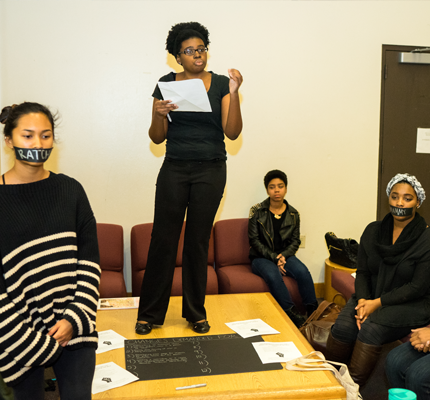October 1, 2012
The U.S. Supreme Court’s 2011-2012 Term and the First Amendment
A TV camera focuses on a nude woman’s buttocks for seven seconds in an episode of NYPD Blue. The FCC fines the ABC television network .24 million for indecency. At the Billboard Music Awards on the Fox Television Network, Cher, referring to her critics, says “So f*** ‘em.” Nicole Richie complains about “getting cow s*** out of a Prada purse,” saying that “it’s not so f**king simple.” At the Golden Globe Awards on NBC, U2 lead singer Bono finds out he has won an award and says, “This is really, really f**king brilliant. Really, really great.” Cher, Bono, Nicole Richie and the producers of NYPD Blue unwittingly instigated FCC actions which would result in not one, but twodifferent Supreme Court decisions (FCC v. Fox Television Stations2009 (Fox I); and FCC v. Fox Television Stations, 2012 (FoxII).
Xavier Alvarez declares at a public meeting that he was a Marine and received the Congressional Medal of Honor. He is lying—in fact, he never even served in the military—and he later pleads guilty to charges under the Stolen Valor Act, but reserves the right to challenge the Stolen Valor Act as a violation of the First Amendment. The Supreme Court sides with Alvarez.
The U.S. Supreme Court decided the Fox Television Stations and Alvarez cases on June 21 and June 28, 2012; they are the two high-profile First Amendment cases from the High Court’s 2011-2012 term. Let us take a closer look at the Court’s reasoning in these two opinions, beginning with Fox Television Stations.
Cher and Nicole Richie spoke their four-letter words in 2002, and ABC broadcast the NYPD Blue episode in 2003. Although the FCC did not levy any fines against Fox for Cher and Nicole Richie’s comments, Fox nonetheless challenged the FCC’s policy banning “fleeting expletives,” arguing that the FCC guidelines were vague and overbroad. In 2009 Justice Antonin Scalia upheld the FCC’s policy in a 5-4 ruling; Justice Scalia wrote that “the pervasiveness of foul language and the coarsening of public entertainment in other media such as cable justify more stringent regulation of broadcast programs so as to give conscientious parents a relatively safe haven for their children” (FCC v. Fox Television Stations at 530 (Fox I), 2009). At this point the Supreme Court remanded the case to the U.S. Court of Appeals for the Second Circuit, but the Second Circuit struck down the FCC’s policy on indecency, explaining that broadcasters had no way of knowing when certain words or shots of bare buttocks crossed the line into indecency; it was not fair that broadcasters were “left to guess” when profanity and nudity would be either acceptable or punishable (Fox Television Stations v. FCC, 2010).
When the Second Circuit found the FCC’s policy on indecency unconstitutional, despite the fact that the Supreme Court had upheld it in 2009, the High Court agreed to hear the case a second time. This time, in a unanimous decision, Justice Anthony Kennedy acknowledged that the FCC’s crackdown on fleeting expletives and seven seconds of nudity did not give broadcasters fair warning regarding what would violate the FCC’s standard of indecency, as the due process clause of the Fifth Amendment would require. Justice Kennedy struck down the FCC’s rulings on the Fox and ABC broadcasts, but added that the FCC is “free to modify its current indecency policy in light of its determination of the public interest” (FCC v. Fox Television Stations(Fox II) 2012). Justice Kennedy remanded the case against ABC for the seven seconds of nudity to the U.S. Court of Appeals for the Second Circuit, which vacated the .24 million forfeiture order (ABC, Inc. v. FCC, 2012).
In a similar but separate case, in June 2012 the U.S. Supreme Court declined to hear the case involving Janet Jackson’s “wardrobe malfunction” for a second time; the U.S. Court of Appeals for the Third Circuit had vacated the FCC’s forfeiture order of 0,000 against CBS for the 2004 Super Bowl Half Time Show, and the FCC appealed, but the High Court allowed the Third Circuit’s decision in favor of CBS to stand (CBS Corp. v. FCC, 2012).
Just as the Supreme Court sent the FCC back to the proverbial drawing board to re-write its guidelines on indecency, the High Court also sent Congress back to the drawing board to re-write the Stolen Valor Act. Congress had passed the Stolen Valor Act in 2006; this law made it a crime punishable by a fine and up to a year in jail if one lied about receiving military medals such as the Congressional Medal of Honor. But at water district board meeting in Claremont, California in 2007, Xavier Alvarez lied and claimed that he had received the Congressional Medal of Honor (the truth was that he had never served in the military). Alvarez challenged the Stolen Valor Act as unconstitutional, in effect arguing that he had a right to lie. When his case reached the Supreme Court, the High Court sided with Alvarez in a 6-3 decision. Justice Anthony Kennedy wrote for the majority, explaining that “the government has not shown, and cannot show, why counter-speech would not suffice to achieve its interest” (United States v. Alvarez, 2012). Justice Kennedy was thus choosing “more speech” over “enforced silence,” following a principle that Justice Brandeis had argued for in Whitney v. California (1927).
Justice Kennedy explained that the Stolen Valor Act was not the “least restrictive means” of discouraging false speech; he argued that it should be “easy to verify and expose false claims.” Furthermore, a private group, the Congressional Medal of Honor Society, maintains an accurate list of medal recipients. Although the Pentagon had at first argued that it could not compile a complete database of all winners of military medals, after the Alvarez decision, the Pentagon announced in July 2012 that it might be able to create a database of award recipients. In the meantime Congressman Joe Heck (R-Nev) and Senator Scott Brown (R-Mass) have introduced a revised Stolen Valor Act which would punish false claims of military awards made “with intent to obtain anything of value,” such as a job.
Although only three years have passed between Fox I (2009) and Fox II (2012), the 180-degree turn in these two decisions might suggest that the High Court has taken a baby step toward a more liberal stance regarding FCC regulation of broadcast content. In Fox I, Justices Antonin Scalia, John Roberts, Anthony Kennedy, Samuel Alito and Clarence Thomas comprised the 5-person majority, with Justices John Paul Stevens, Ruth Bader Ginsburg, Stephen Breyer and David Souter dissenting. In contrast, the Supreme Court reached a unanimous 8-0 opinion in Fox II (Justice Sonia Sotomayor did not participate), suggesting that Justices Scalia, Roberts, Kennedy, Alito and Thomas threw in the proverbial towel and acknowledged that broadcasters need clearer guidelines from the FCC regarding indecent language.
In United States v. Alvarez, Justices Anthony Kennedy, John Roberts, Ruth Bader Ginsburg, Sonia Sotomayor, Stephen Breyer, and Elena Kagan comprised the six-person majority, and Justices Antonin Scalia, Samuel Alito and Clarence Thomas dissented. This case might also suggest a baby step toward a more libertarian approach toward the First Amendment in the sense that more speech is presented as a preferable alternative to fines or prison in confronting outright lies.
In sum, for the time being, celebrities can use fleeting expletives on television, at least until the FCC creates new guidelines clarifying what is indecent, and liars can claim they have won military medals. But if Congress passes a better Stolen Valor Act, it may not be this way forever.









